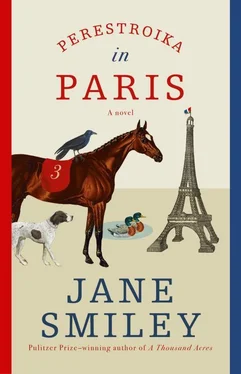And that was how the two of them agreed upon what the house was for and what the house was not for. That she had made a small mistake in the grand salon was fine with Étienne. He found himself a bucket, threw the manure out the window into the berry patch, and did a little mopping.

THE MANURE WAS not unnoticed, except by Madame de Mornay, who was still sleeping soundly. If Paras had looked closely, she would have seen, in the corner of the grand salon where she’d made her deposit, a small hole in the wall where the floor molding had chipped and broken away. That hole was the entrance to a rather large estate belonging to Conrad and Kurt, father and son, two black rats who were part of a family of rats who had been living in the walls since long before the Mornays had ever been heard of. The rat family had once been quite extensive, with connections all over Paris, but some years before, a prolific tribe of cats had moved into the Champ de Mars, and reproduced to such a degree that most of the local rats, especially the smaller black ones, had either been wiped out or moved on to the Place des Invalides. Conrad and Kurt sometimes went for days without seeing, or, more important, hearing another rat in the neighborhood. The two main entrances to the rat estate were in the very storeroom where Étienne had gotten the kale and the carrots—one opening was not far from the flour bin (this one was larger, and normally used to carry provisions into the estate), and the other opening was down the wall a ways, behind the lentil bin. Kurt and Conrad and their predecessors had long since given up trying to chew their way into the various bins, barrels, crates, and even bags, because Étienne was not much good at cleaning up spilled provisions, and going down the short staircase had been too much for Madame de Mornay for years now. Kurt and Conrad were fat and lazy, though still much more stylish than brown rats. Many times every day, they went out the exit and in the entrance, picking up whatever Étienne left behind. This was largely the reason why Étienne didn’t realize that the place was such a mess—Kurt and Conrad worked as his cleanup crew.
The estate was an enormous maze that ran all through the walls of the house and had several exterior openings as well. Conrad had sometimes gone out into the world in hopes of finding a rat or two, preferably black, preferably female, to join them in the estate. But the cat tribe was as avid and skilled as they had always been—they were everywhere, Conrad could sense them, he did not want to run into a lean and hungry feline when he was just trying to find a friend. Kurt was thus rather pleased to see, out the second-story window (his own aperture was a hole in the wall just below the sill), a certain canine pacing back and forth in front of the house. She had come at dusk, and now she walked for a moment, paused, lifted her head, sniffed, gave a single, urgent bark, then walked some more. Kurt knew which dogs were ratters and which dogs considered rats beneath them. This dog was just the sort who wouldn’t look at a rat—all about birds, these dogs were. Even though Kurt had never heard of its happening, he could imagine taking such a dog on as a protector. Conrad said that this was a ridiculous idea, but Kurt thought that it was merely “imaginative.” And Conrad agreed that, once you had a horse in the house, just about anything was possible. Conrad was old; Kurt was young. He knew that there were young female rats out there, and he thought of female rats more and more as he matured. He did not intend to give up on finding one of his own until he had at least tried something.
Instead of taking a little nap, which he sometimes did around dusk, Kurt gazed out the aperture until the canine moped away. Then he went through the wall into one of the uninhabited chambers and chewed meditatively on some linen drapes. He knew that Conrad was down in the storeroom, waiting to see what Étienne would leave for them. And it didn’t matter to either of them that the horse might get some of what was rightfully theirs. There were plenty of provisions to go around, and always had been.

MADAME DE MORNAY HAD expected her outing to take a lot out of her, and it did. When she woke from her nap, she was still exhausted. She rang her little bell, the one that called Étienne to her. He came at once, because it was very important to him that his great-grandmama stay in her room, at least until some idea of where to put the horse came to him—the grand salon and the cuisine were both places where Madame de Mornay spent a good deal of time. The library was a possibility, but it had hard, slippery floors, and windows onto the Champ de Mars. And whether Paras could or would be able to negotiate stairs was a question he had to answer. But the Feast of the Immaculate Conception had done Madame de Mornay in. She sat up in bed, drank a mélange of milk and honey with dried chamomile, and fell asleep for the night over her book, which was the last volume of À la recherche du temps perdu, a book she had been reading for eighty-three years and never quite finished. She kept at it, though, because her mother had met Monsieur Proust once at a party.
For himself and Paras, Étienne put together a pleasant degustation of shredded cabbage, withered apples (Paras smacked her lips, they were so tart and sweet at the same time), chopped beets, and more sweet potatoes. He offered her some pieces of cheese, his own favorite, but she wrinkled her upper lip and turned it down, as she also turned down the dark chocolate. Kurt, who was standing just inside the entrance to the rat palace, fluttered his whiskers at the odor of the dark chocolate. He would have liked a taste, but it was something Étienne never dropped and never left on the counter. After her meal, Paras took another long drink of water from the sink, and then went outside. Étienne huddled into his jacket and went outside with her. While they were gone, Kurt gathered up the remains of their meal, and also a single dried anchovy that he and Conrad must have missed from some earlier time. It was a mere fragment, but delicious all the same.
That night, Frida trotted back across the Pont d’Iéna exactly as if she knew what she was doing, and, in a way, she did. She hadn’t been to the Place du Trocadéro since the leaves were fluttering off the trees; it existed in her memory as a place of comfort and richness—her little hiding place in the cemetery, her enjoyment of not only the provisions but also the well-dressed passersby, the tiny dogs in their purses who would growl at her (for a long time, she’d thought that was what purses were for), the cigarette smokers lounging beside the walls (Jacques was a smoker when he could afford the cigarettes and occasionally he’d splurged on a bottle of champagne—he’d even given her some in her water bowl). Jacques had taken much pleasure in the lights and the busy social scene, had even thought himself, in a way, a part of it, since he had grown up on the Avenue de Messine, and liked walking past his old building when he could. One of Frida’s favorite things had been to sit, erect and proud, on the top step of one of the two buildings at the Palais de Chaillot (she had heard humans talking about it—a museum about buildings in a large building). Jacques hadn’t felt it worth his while to spend the money to go inside, though there were other museums he had entered, leaving Frida to guard his guitar on the street. She had also spent some time, while Jacques was asleep, exploring the cemetery that overlooked the square—he liked it because it was quiet there, enclosed, a good place for a long sleep.
Читать дальше











